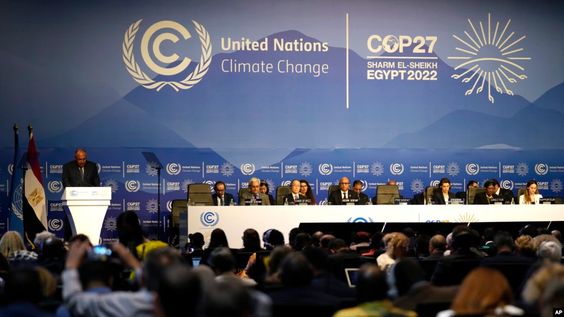Africa
Niger Urges Rich Countries to Operate the “Climate Loss Fund”

Rich nations are expected to assist those who bore the brunt of their global warming emissions through the “loss and damage” fund established at the COP27 climate summit last month. As communities fight for diminishing resources in Niger, desertification and conflict have been exacerbated by climate change.
It is sometimes stated that people who contributed the least to climate change will suffer the most as a result. In Niger, this is especially true.
According to nonprofits like Concern International, the Sahel region of Africa, which includes Niger and its neighbors, is expected to experience a 3- to 6-degree Celsius temperature increase by the end of the century. This will have catastrophic effects on one of the world’s poorest and hardest-to-farm regions.
Niger, however, contributed only 0.007% of world emissions in 2021.
The United Nations says that the change in climate is also making it easier for extremist groups like al-Qaida and the Islamic State to grow.
The country director for the World Food Program in Niger is Jean-Noel Gentile.
The population then competes for the same resources, which are becoming more scarce as a result of climate change, according to Gentile. “Therefore, insecurity and climate change are directly related.”
A “loss and damage” fund was decided upon at the most recent U.N. COP27 climate summit in Egypt to assist nations like Niger. In theory, wealthier countries and major greenhouse gas polluters will help the most vulnerable countries cope with climate change.
The cost of the harm brought on by climate change, according to nonprofits, might reach $1.8 trillion by 2050.
Garama Saratou Rabiou Inoussa, the environment minister for Niger, told VOA that the fund needed to get going right away.
She claims that there is an urgent need to make the funds usable.She adds that it is vital to make the funds accessible through a simple funding system that benefits nations like Niger in addition to making the monies operational.
In a town near the Nigerian border in Niger, where the fund is needed, lives Haoua Coba Maigardaye. As part of a World Food Program project, the farming methods in the hamlet have been changed so that people can grow crops not only during the rainy season but also during the dry season.
Because they can grow crops twice a year, she claims that food production has increased and that both the older and younger generations of the hamlet are no longer forced to look for jobs elsewhere. It’s an improvement, she continues, because there is now plenty of food available both for consumption and for sale.
A farmer claims there is not enough food in a nearby village where there is no aid.
Environmentalists contend that specifics, such as the operation of the fund and the route by which funds would be sent to communities like Zinder, must be spelled out.
Steve Trent works with the Environmental Justice Foundation, an environmental charity with roots in the United Kingdom.
The industrialised governments’ just deciding not to pay is one of the political difficulties. “When you want the government to write that check, it’s difficult,” said Trent. “Getting them to do it is challenging, especially given the current state of the world’s economy.”
In an attempt to explain how the fund may operate and how long it might take to become active, the United Nations Framework Convention on Climate Change declined to grant an interview.
